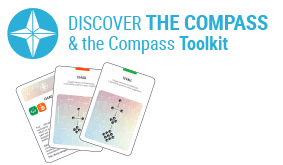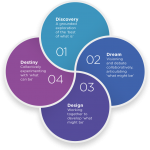Setting up a coaching programme
/Almost two years ago our Center started to design and develop a coaching programme which aims to contribute to the transformation towards a knowledge based learning organization. After the initial pilot phase we thought it was useful to reflect back on our experience and interviewed Nat Clegg on the importance of coaching and the creation of a learning culture.
Why is coaching important for a training institute as the ITC-ILO?
The ITC-ILO must be an organisation that has to be fluid and robust in today’s forming, reforming and demanding world arena to conclude good results within their teams and for others. With efficacy in mind, the only competitive advantage you have is your people, so investing in them and helping them be the best they can be gives your organisation an advantage.
With this in mind it is important that people who work and deliver for the Center have a point of contact with someone who can not only listen to their aspirations and tribulations but can help them contact their authentic self and in turn can discover how to further their external skills and approach with others.
The important factor here is that I believe people operate well when they function as a whole person, with clear intention and integrity.
We started almost two years ago with a group of colleagues in this coaching project. Can you describe what it looks like (flow) and what it potentially can change?
The project follows a model that enables each participant to understand some of the basic concepts of traditional coaching methods by then attending a two-day introductory programme. After this, each participant engages with me in six coaching sessions on a one to one basis. This is where the real work unfolds. From the first pilot we realized that some people need one or two additional sessions to finish the work they are doing and so the ITC-ILO has been flexible in recognizing this. However, an important feature here is that at the end of the process each participant must feel that they do not rely on me and that they have more personal tools for their self-efficacy.
Which coaching models do you use and apply?
Coaching is ostensibly future oriented. Its purpose aims to capture and employ the creative nature of Coaching Psychology’s various techniques and methodologies to conscious good effect so that the client finds how they can move forward.
As a coach I believe that the correct methodology should be found in relation to the clients need, there isn’t and shouldn’t be fixed procedures for all. However, to give you some idea I use some models and approaches below:
Solution focused coaching, NLP models, Transactional Analysis models, Transpersonal Enquiry, Graphic Analysis, Art Therapeutic Devices, Appreciative Enquiry, Psychosynthesis and Narrative Enquiry.
However, these are but a few techniques that help the client surface meaning and direction. They don’t usually notice the tools employed as they are subtle parts of the conversational development with each other, but they are definitely there for me to understand what stage we are at. Each session is recorded by notes, which are always available to the client. Nothing is hidden, this is important as trust is a key factor in the purpose and function of the work.
Some initial exploration, questioning and surfacing can be, for example;
What is the client’s state of being at the moment?
What is expected to happen in life?
What are we being?
How are we doing?
What is tolerable?
Where are we going?
This can lead to initially expanding the sense of self and what is consciously apparent to also what makes “no sense” (non-sense) of their personal construct, internal identity and external perception. For some, this can move to something beyond the notion of what we commonly perceive as the “Self”. This can lead to developing a better capacity to view differences and a significant reduction in disappointment, doubt, anger, aggression towards increased tolerance and compassion, human or otherwise. The sense of Self is what people search for. Levels of happiness are often part of that exploration, these being, do the clients understand their sense of purpose and meaning in their lives and what experiences are valuable for them and why? The multidimensional internal shape of us leads to external behaviours; these are what we display but the question we need to understand about that is, are we conscious of this to conjure up sound personal effectiveness? Coaching embraces opportunities for this self-realisation many times.
One of the leading issues for people is, what is wrong, what has gone wrong. Coaching can help the client to access more than external immediate judgments or measures imposed on or from them. Coaching is not about focusing on the past and what has gone wrong or why, but more about a focus on the future. What may be important here is that the coach and client bring new meaning to a situation and address what and how the perceived problems, stress and malaise can be processed and where the energy for this may come. In turn the client finds their own way and bring to light their approach to survival, fulfillment, motivation and self-realisation. Coaching is about how life can become better; the instrument of course is the Self.
In short, these conversations, writing, and in my practice, the use of art generates change for each client. This is largely about the client’s efficacy at work but will include elements about their private life as we can appreciate that we don’t leave our personality at home.
What was your most memorable learning moment to date in ITC-ILO?
One example could be when a client used a model I shared with them to solve a complex behavioural rift with another person. They worked on this with me and executed their learning to a very good affect and successful lasting outcome, in turn they became much more aware of themselves and what others’ may bring to working relationships with others.
Another could be when a client was in particular distress and was suffering as a consequence. Using a select methodology we brought about a deeper understanding of why a repeating behaviour was causing internal conflict and misery. When I meet this person now they tell me that they feel a lot happier, to me, they “feel” much more positive…they seem a lot lighter in spirit.
How can coaching become a sustainable learning tool for the organisation itself?
The program appears to have been successful so far. During the second cohort Skype coaching became a feature for some as they were distant from the Center but wanted to take part in the coaching offer. This also has become useful for the plasticity of coaching for all in the organisation.
Coaching is starting to become common currency within the organisation. Some of the people that went through the pilot and second cohort are using coaching elements as a style of management so their staff are now beginning to expect a new and more effective management style that encourages people to find solutions to the problems they face.
Another aspect worth mentioning here is that the clients are from all levels that work at the Center. This is also critical, as the role does not indicate the value on offer. It is the person that counts. Also, the coaching is about being functional, rather than being curing or corrective, having a coach has not been about under-performance in the organisation. People have chosen to do this and have submitted requests to HRM to take part. This indication is significant for others to consider participation.
So, if the project works maybe there could be an on going offer at the Centre for people who need it each year. In addition to this, there could be an offer to other agencies from ICT-ILO for them to buy in this service; for example, Skype coaching could be a way of making coaching available for others far from Turin. So, the journey may continue…
3 Books to read?
Yallom, I.D.( 2002) The Gift of Therapy – An open letter to a new generation of therapists and their patients, Piatkus Books
Whitmore, J. (2002). Coaching for performance: Growing people, performance and purpose. London: Nicholas Brealey.
Brown, I & Somers, B. (2008) The Raincloud of Knowable Things, Archive Publishing
3 must read articles on coaching (this may be more about the particular direction I take)
Duggleby, W. et al (2009) Hope, self-efficacy, spiritual well-being and job satisfaction, Journal of Advanced Learning, Vol 65, No11, Blackwell Publishing Ltd.
Gozdz, K. (2000) Toward Transpersonal Learning Communities and Business, American Behavioral Scientist, Vol. 43 No.8, 1262-1285
Sparrow, S. (2007) The Benefits of Transpersonal Coaching, Training and Coaching Today , September edition.
3 websites to consult
http://www.coaching-at-work.com/
http://www.coachingnetwork.org.uk/resourcecentre/articles/default.asp








